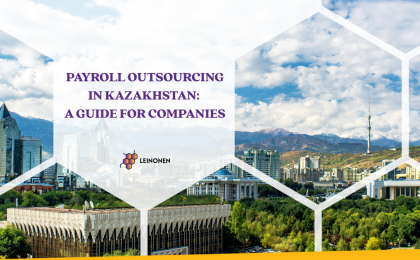Over 25 years of experience has brought us hundreds of clients along the way wanting to expand their businesses abroad. Being good or maybe even the best on your own market is one thing but going global with your business brings to light a set of considerations for business owners to evaluate, including market trends and analysis, political and economic factors, entity set-up, legal barriers, competitors´ overview, hiring workforce, etc.
Now that Leinonen Group has 14 offices in 12 countries and the company has a reliable international network of accountants, lawyers, payroll advisors, etc. we can help others who are in a similar situation wanting to move their business abroad.
Therefore, we have written down 5 important aspects to consider before going global and what to keep in mind when assessing the benefits and risks to a business entering a new market.
1. Market analysis and a strong business case
Even though a market analysis of a target country or region seems obvious, many companies forget the importance of it or don´t do it very thoroughly. Quite often we notice companies wanting to expand their reach starting with neighboring countries believing they know the local market well enough without detailed research. But when digging into the details of cultural differences, consumer behavior, market trends, language barriers, competition, taxation, legal aspects, or employment regulations, one might be surprised how different our neighbors can be.
You can read the story of Leinonen Group´s first expansion to the Estonian market over 25 years ago and what were our learnings on the way from the article “Make it or break it – expanding your business abroad”.
Based on our experiences we suggest doing your homework very thoroughly, making market analysis and a strong business case before going global as the more prepared you are the greater your chances of success. Without a thorough business plan, your company might lose hundreds of thousands in an instant and damage your brand along the way.
2. Proper entity set-up
When establishing a company abroad, it’s crucial that the company form and registration comply with the local legislation. The number of founders, capital requirement, division of responsibility and decision-making, financing, and taxation is only some factors that influence the choice of which legal entity to choose. Therefore, make sure that the chosen entity form is financially the most profitable for you.
As every market is different, we highly suggest consulting with local authorities or service providers before making a final decision about entity set-up as the registration processes vary a lot by the market by the amount of time and resources needed.
If you plan to expand to Estonia, Latvia, Lithuania, Belarus, Bulgaria, Finland, Hungary, Poland, Russia, Sweden, or Ukraine, you can always consult with Leinonen offices and use our best knowledge and experiences from the local markets.
3. Understanding local laws and regulations
Different markets have different regulations when it comes to taxes and local laws. The taxation of international businesses changes frequently and is somewhat difficult to comprehend.
As legal regulations affect everything from establishing a company to the hiring of employees, it´s better to minimize the risks and to investigate specific regulations rather sooner than later.
Carefully consider also how your home country treats income earned internationally as this might impact profits significantly. The earlier in the process regulations enter the decision, the better for your company, as they might impact your mode of entry choice.
There is an interesting case study published by Leinonen Latvia that illustrates well the importance of knowing local regulations. From the case study, you can find out how they helped a client to recover an incorrectly calculated corporate income tax in the amount of 100 000 euros.
4. Hiring employees globally
Are you planning to open a local office or simply use remote workers in different markets? Will you use ex-pats or focus on local talents? Whatever decisions you make, be aware of local employment laws and how your human resource plans will need to comply with local requirements.
In many markets employment legislation creates the general framework of the terms and conditions of employment, but the unions of employers and employees enter into collective agreements that are more specific than the law. Some of these collective agreements are universally binding. This means that even unaffiliated employers which don’t belong to an employers’ organization must apply the terms and conditions of the sector’s collective agreement. If the terms of an employment contract are not in accordance with a binding collective agreement, they are not legally valid. For example, in Finland, there are more than 100 binding collective agreements to consider!
Money is a sensitive matter and managing employee salaries should always be handled with the utmost care, confidence, and punctuality. If you use a payroll partner as many companies do, make sure they provide compliance support in-country and most importantly also communicate in the local language.
5. In-house or outsourced services
For many businesses, outsourcing the accounting and payroll functions help them simplify company operations whilst being able to take advantage of financial and legal specialists, optimize costs and increase efficiency.
The COVID-19 crisis has uncovered a complex and challenging business environment, and more companies are considering the outsourced option as they look at saving costs and focusing on their core business activities. But there could be also other reasons companies outsource functions like accounting. There may be a stakeholder/ investor requirement to have an independent party, they could be looking to save costs, or they may just want the best local expertise available.
In summary, expanding your business globally can be complex and these are only 5 factors we often notice that get too little attention, but of course, there are many more to consider. Important is to do the proper homework, to prepare a strategic business case and if you lack local expertise, don´t be afraid to lean on a trusted international partner, who can provide the local expertise to address your needs in any country.
To learn more about Leinonen Group services and how we can help your business to go abroad, please visit our website for further info and contacts – /



